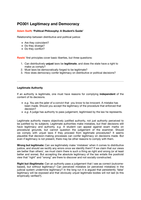Class notes
PO301 Revision Notes - Legitimacy and Democracy
- Course
- Institution
Revision notes on Legitimacy and Democracy in Political Theory. Topics covered: - Legitimacy - Democracy - Authority - Intrinsic and instrumental view of democracy - Procedural democracy - Democratic equality - Social choice theory - Epistocracy - Publicity and representation - Judicial review - Ra...
[Show more]



